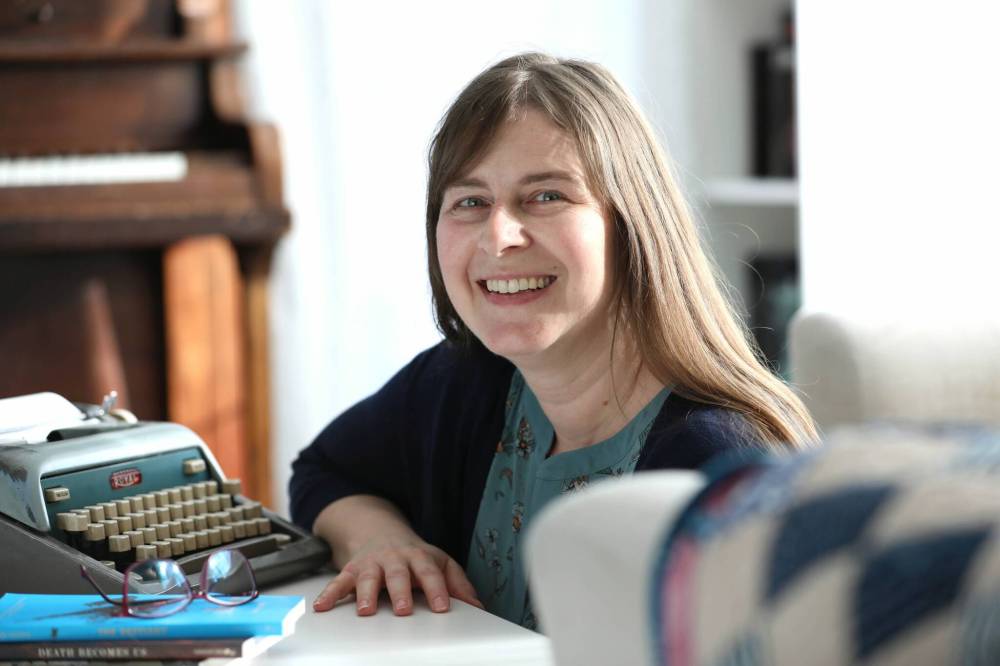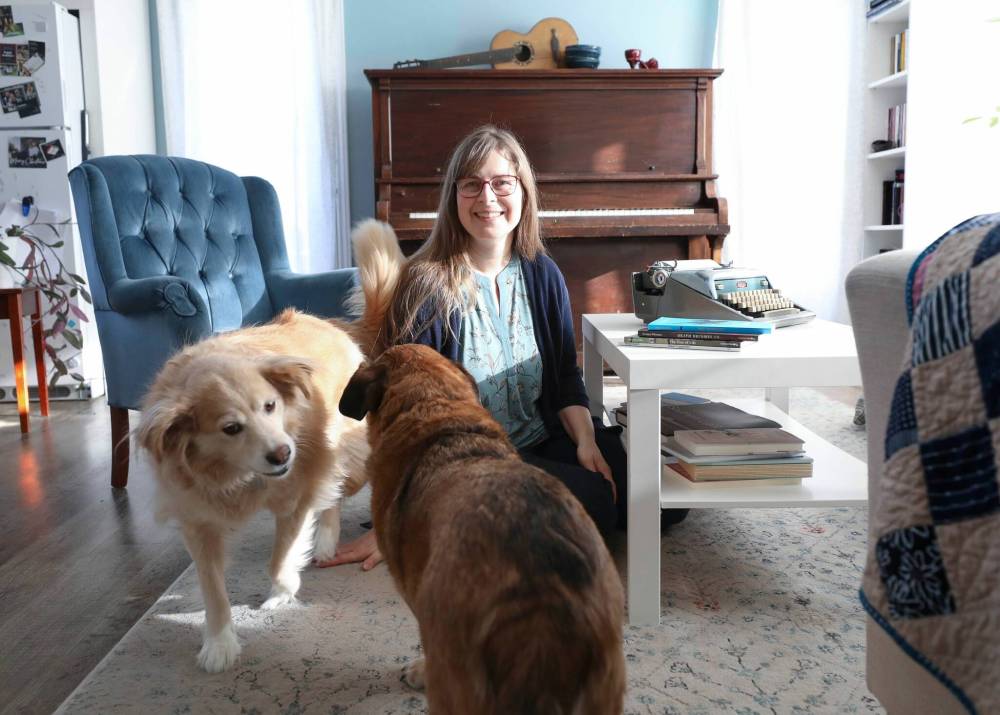Words of a feather By shifting to online events, the Speaking Crow open-mic series allows more aspiring poets to flock together
Read this article for free:
or
Already have an account? Log in here »
To continue reading, please subscribe:
Monthly Digital Subscription
$0 for the first 4 weeks*
- Enjoy unlimited reading on winnipegfreepress.com
- Read the E-Edition, our digital replica newspaper
- Access News Break, our award-winning app
- Play interactive puzzles
*No charge for 4 weeks then price increases to the regular rate of $19.00 plus GST every four weeks. Offer available to new and qualified returning subscribers only. Cancel any time.
Monthly Digital Subscription
$4.75/week*
- Enjoy unlimited reading on winnipegfreepress.com
- Read the E-Edition, our digital replica newspaper
- Access News Break, our award-winning app
- Play interactive puzzles
*Billed as $19 plus GST every four weeks. Cancel any time.
To continue reading, please subscribe:
Add Free Press access to your Brandon Sun subscription for only an additional
$1 for the first 4 weeks*
*Your next subscription payment will increase by $1.00 and you will be charged $16.99 plus GST for four weeks. After four weeks, your payment will increase to $23.99 plus GST every four weeks.
Read unlimited articles for free today:
or
Already have an account? Log in here »
Hey there, time traveller!
This article was published 26/01/2022 (1411 days ago), so information in it may no longer be current.
Ejecting Zoom “bombers,” co-ordinating acts from as far away as the Philippines and cracking puns; it’s all in a night’s work for Angeline Schellenberg, the host of Winnipeg’s longest-running poetry open-mic reading series.
“I’m there to make every Speaking Crow event look and feel great: I guess that makes me an accessory to murder,” Schellenberg says drily.
She started hosting duties in March 2020 but with COVID-19 , the event, previously held at the Carol Shields Auditorium in the Millennium Library, shifted online and into the homes of the attendees.
Speaking Crow
Find Speaking Crow on Facebook @SpeakingCrow. Gatherings take place every first Tuesday of the month. The next event is on Feb. 1.
Entry is free for both performers and audience members.
“I only hosted in person one more time at the library; most of my work as been on Zoom,” says Schellenberg, who had twice subbed for former host Steve Locke.
Speaking Crow evenings kick off with poem about a crow (a group of crows is called a murder) and a 15-minute performance by an accomplished Manitoba poet or spoken word artist, followed by an open mic.
“I work hard to bring in a diverse mix of featured readers,” Schellenberg says.
“I call on some poetry superstars like Dennis Cooley, Di Brandt and Duncan Mercredi, but I also love introducing the community to new artists like first-time author Tamar Rubin and young slam poet Victoria Redsun.”
For Schellenberg the move from real life to virtual brings its own challenges.
As the host, there are more things to think about when running an online reading, and it’s also harder to soak in the poems, she says.
“I’m sure I’m not the only writer who misses hearing the audience’s reactions as I read,” she says.
“The laughs, gasps, sighs and claps were valuable feedback on which lines hit home.”

Although the library was a convenient location for people living downtown, Zoom is more accessible in some ways, but less so in other ways.
“We’ve lost a few regulars who may be uncomfortable on camera, lack reliable access to the internet, or feel all Zoomed-out from work or school by the end of the day,” Schellenberg says.
Teacher Ted Landrum began attending Speaking Crow at Aqua Books in the summer of 2008 and has continued to participate since it’s moved online.
“I have missed a few, but try to join every month if I can. Poetry is all the more urgent when people are isolated, and society is even more fragmented than usual,” Landrum says.
“We might be connecting online, but the exchange is real-life, because language is real-life, and so is poetry.”The benefits of moving online outweigh the disadvantages of virtual events, they say.
“We’ve widened our reach. Writers who found it difficult to attend due to distance or disability can now come,” Schellenberg says.
‘I’ve heard from grateful attendees who’ve wanted to come for years but didn’t have the health or confidence to do so in person.”
“We’ve widened our reach. Writers who found it difficult to attend due to distance or disability can now come.” – Angeline Schellenberg
Being online has made poetry more inclusive, Landrum adds.
“The space and place of a live, in-person poetry reading, is never reducible to the single place where the people participating have physically assembled; a poem read, whether aloud or silently, has many places in it, just as a poem has many voices in it, some muted, others not,” Landrum says.
“A poem happens wherever people hear it, see it, or project it.”
Fiona Smith, who read at Speaking Crow for the first time last February, credits the experience for “opening up her world.”
Following her performance, Smith was inspired to attend a virtual writing workshop, which culminated in her reading at last year’s online international World Poetry Day event.
“Joining led me to consider other possibilities. Who knew that showing up for a virtual night of poetry could have such big ripples! Clearly, there is magic in Speaking Crow,” Smith says.
Landrum has also benefited from the regular gatherings.
“The opportunity to exchange poetry — sustained on a regular basis — has led to a book of poems I might not otherwise have been able to publish,” he says.

The Zoom events unfold in the same way they did pre-pandemic with one big exception: the online audience is muted while performers read.
“To make sure there are no Zoom bombers, everyone stays muted. Zoom bombers are people who somehow find our link and come into the meeting,” she explains, adding that on one occasion a young reader was interrupted by a “bomber” yelling insults.
”It was upsetting,” she says. “We want to make it safe for everybody so they can say what they want without fear of being hurt.”
Poetry themes range from heavy-hitting topics such as politics and religion to odes to Star Trek and paeans to pelicans. Loss has also been a common theme during the pandemic, while others have written about walks in nature and concern with environmental issues.
Schellenberg is happy with the breadth of writers who now read at Speaking Crow. It’s rare to find a community so inclusive, where things like class, religion or politics that often divide people don’t matter, she adds.
“Since going digital, we’ve been enriched by voices from Australia, Pakistan, Malaysia, the U.K., California and the Yukon.
“A poet from the Philippines performed to the accompaniment of crowing roosters outside his window — since his time zone is 14 hours ahead, it was already morning,” she says enthusiastically.
“Since going digital, we’ve been enriched by voices from Australia, Pakistan, Malaysia, the U.K., California and the Yukon.” – Angeline Schellenberg
“Retired professors read alongside high school students, new parents perform with their children on their laps.
“A few have read poems about their work as teachers, cooks, architects or editors, or about the challenges of being unemployed or on disability, but I don’t know what most of them do, because it’s not important: we’re all there because we love poetry.”
With all these advantages that the online platform brings, will Speaking Crow ever return to the Millennium Library?
“I hope someday we can return to meeting face-to-face but at this point we don’t have plans to do it in person,” she says.
“We are just waiting to see what happens. We all really hope that if and when we go back to going in person we won’t lose our online presence and the people who perform online.
“I don’t want to exclude anybody.”
Twitter: @nuchablue

Our newsroom depends on a growing audience of readers to power our journalism. If you are not a paid reader, please consider becoming a subscriber.
Our newsroom depends on its audience of readers to power our journalism. Thank you for your support.





